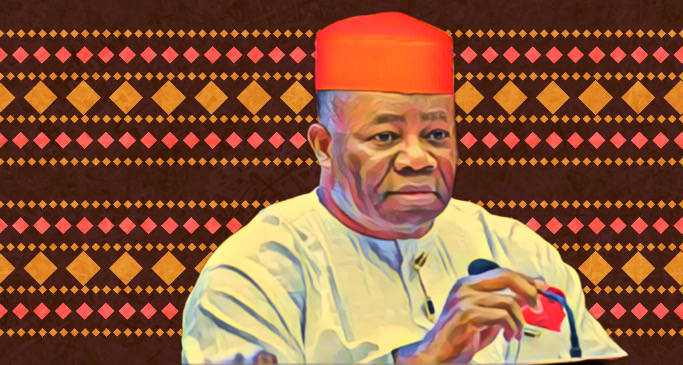In a riveting development within the Nigerian political landscape, Senate President Godswill Akpabio has found himself at the heart of a controversial suspension saga involving Senator Abdul Ahmed Ningi. The incident has sparked widespread debate, drawing in prominent legal minds and prompting a stern rebuttal from Akpabio, who vehemently denies personal involvement in Ningi’s suspension.
Senator Ningi, representing Bauchi Central Senatorial District, was suspended from the Senate on March 14, 2024, for a period of three months. This disciplinary action was taken following an interview Ningi granted to the BBC, where he leveled serious allegations against the senate leadership, accusing them of inflating the 2024 budget, a practice colloquially known as “budget padding.”
The suspension caught the attention of Femi Falana, a renowned human rights activist and lawyer, who swiftly leaped into action. In a letter dated March 27, 2024, addressed to the Senate President, Falana demanded the immediate reinstatement of Senator Ningi. He framed the suspension as an unjust action, portraying Akpabio as the orchestrator behind what he viewed as an affront to democratic principles and legislative freedom.
Responding to these accusations, Akpabio, through his legal counsel Chief Umeh Kalu, SAN, articulated a detailed defense, distancing himself from the direct responsibility for Ningi’s suspension. Kalu’s response, rich in legal nuance, stressed that the decision to suspend Ningi was a collective resolution by the Senate, arrived at through a democratic process during a plenary session, rather than a unilateral action by Akpabio.
Kalu further clarified Akpabio’s role in the proceedings as that of a presiding officer, tasked with reflecting the majority decision of the Senate, rather than acting as judge, jury, and executioner in Ningi’s case. This rebuttal attempts to dismantle Falana’s accusations by emphasizing the procedural integrity and the legislative autonomy of the Senate’s actions.
The letter to Falana also touched on legal precedents and the constitutional debate over the power of legislative bodies to suspend their members. While acknowledging the relevance of court decisions cited by Falana, Kalu pointed out the necessity of considering the unique facts and legal frameworks pertinent to each case. He subtly critiqued Falana’s approach, suggesting a more nuanced understanding of legislative privileges and the legal landscape governing legislative proceedings was needed.
Akpabio’s defense, as articulated by Kalu, also underscored the legal protections that shield legislative actions from external judicial interference, highlighting the principles of separation of powers and parliamentary immunity. The communication hinted at the complexities involved in challenging legislative decisions, while simultaneously asserting the Senate’s commitment to its rules and the broader legal and constitutional framework.
This legal skirmish has not only illuminated the internal dynamics of the Nigerian Senate but also thrown into sharp relief the tensions between legislative authority and individual rights within the political sphere. Akpabio’s response, through his counsel, encapsulates a broader dialogue on democracy, governance, and the rule of law in Nigeria.
As the situation continues to unfold, the eyes of the nation remain fixed on this dispute, which transcends the immediate controversy over Ningi’s suspension. It poses fundamental questions about legislative ethics, the accountability of political leaders, and the delicate balance between individual liberties and collective decision-making in democratic institutions.
The discourse surrounding Ningi’s suspension and the subsequent legal back-and-forth between Akpabio and Falana serve as a microcosm of the larger challenges facing Nigeria’s democracy. As the debate rages on, it offers a poignant reminder of the ongoing struggle to define the contours of democratic governance in a way that respects both the rule of law and the principles of justice and equity.


